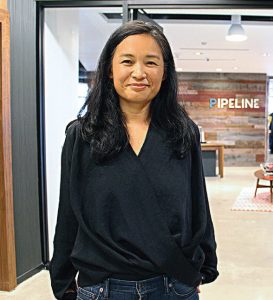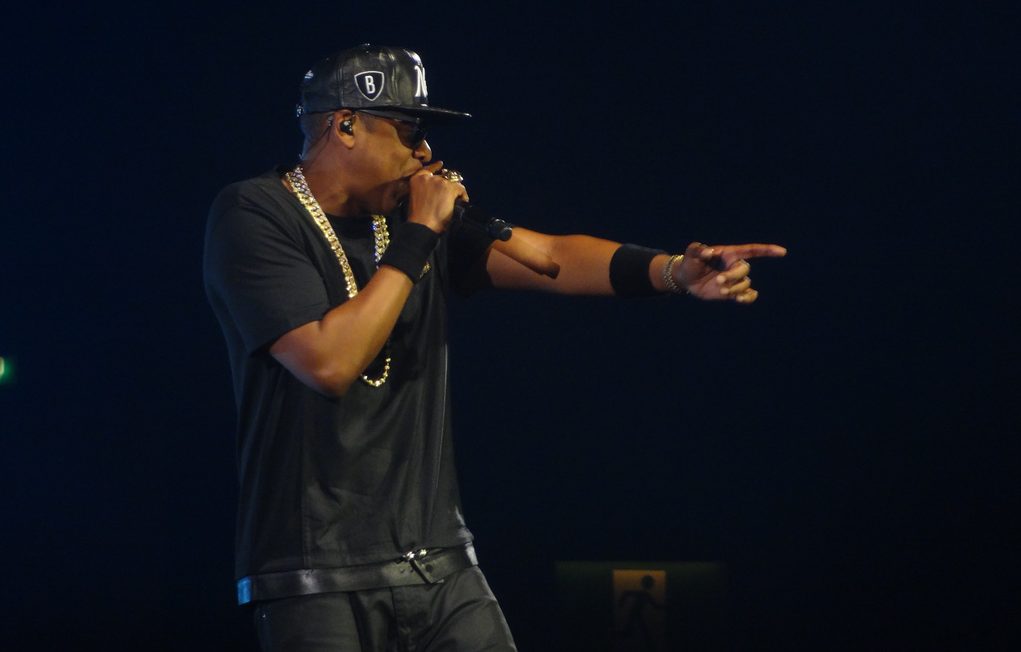Tayyib Smith looks at his co-conspirator, Meegan Denenberg, as they mirror sly smiles to one another. We’re in a conference room at Pipeline, the Center City coworking space co-founded by Smith, a 45-year-old marketer, activist, public intellectual and music impresario.
“I mean, we were like, ‘duh,’” he says now. “You mean no one thought these two areas could work in tandem with one another?”
Denenberg, Smith’s partner in their Little Giant Creative Agency, laughs. “It was a no-brainer,” she says.
They’re talking about their Institute of Hip Hop Entrepreneurship, for which they were recently awarded a $308,000 Knight Cities Challenge grant. By teasing out object lessons from the business of hip hop, they have a bold, visionary plan that not only seeks to upend the way kids learn about business, but could go a long way toward making the study of business cool. The timing couldn’t be better. After all, when Jay-Z says, “I’m not a businessman. I’m business, man,” he’s alluding to hip hop’s place in the zeitgeist as a groundbreaking cultural movement, a dynamic melding of art and entrepreneurship.
It wasn’t always the case; back in the early ‘80s, when I was getting my white man overbite on to Rapper’s Delight by the Sugarhill Gang, conventional wisdom held that what would become hip hop was nothing more than a passing fad, disco with spoken word. Little did we know that a movement was starting, in music and the culture at large. Back then, black artists like Marvin Gaye signed on with white corporations, which controlled the means of production. When Prince observed in the mid-‘90s that “if you don’t control your masters, your master controls you,” he was giving voice to what a generation of rappers had already shown: That there was self-empowerment in not only being the artist, but also the producer, the financier and the owner of your own master recordings.
Today, hip hop is a $50 billion industry, driven by dynamic artist entrepreneurs. “People hear us say ‘hip hop’ and they think we’re trying to create the next celebrity,” Smith says. “We’re not. We want to use best practices of how people became successful within hip hop to inspire a new generation of entrepreneurs.”

Smith and Denenberg say there are lessons galore, as hip hop artists continue to diversify and build empires. There’s Sean “Diddy” Combs’ forays into clothing and spirits lines, where he’s partnered with British distilling giant Diageo. There’s Jay-Z, who once rhymed “reverse merger” with “no need to converse further” in a rap entitled “Corporate Takeover;” his countless deals and partnerships add up to a net worth in excess of $500 million. There’s Dr. Dre’s $3 billion Beats deal with Apple. In all these cases, these entrepreneurs imagined the next new thing before others; they invented the future, in keeping with Henry Ford’s long-ago (perhaps apocryphal) observation that “if I had asked people what they wanted, they would have said faster horses.”
One local example of the trend is Troy Carter. Growing up in West Philly, his father in jail for murder, Carter, an aspiring high school rapper, staked out DJ Jazzy Jeff’s recording studio until Will Smith took him in and gave him a job. Carter went on to do the same for Puff Daddy after a unique interview: “See that girl behind the bar?” Diddy said. “Get her for me and you’re hired.”
Today, Carter is 43 and an entertainment mogul, founder and CEO of Atom Factory management company, with clients like John Legend and Meghan Trainor. It was Carter who went over the heads of the Entertainment Industrial Complex by connecting the then-unknown Lady Gaga directly to an audience via social media. In true hip hop reinvention form, Carter, following a painful breakup with the superstar he discovered and nurtured, has remade himself into a venture capitalist with stakes in disruptive companies like Uber, Lyft, DropBox and Spotify.
“Troy is a perfect example of the paradigm,” Smith says. “But we don’t just have to look at multi-millionaires. There’s also a wide community of people who were first inspired to enter business because they were a part of hip hop culture.”
Hip hop is a $50 billion industry. “People hear us say ‘hip hop’ and they think we’re trying to create the next celebrity,” Smith says. “We’re not. We want to use best practices of how people became successful within hip hop to inspire a new generation of entrepreneurs.”
Smith has produced shows for The Roots, Jill Scott and others; knowing firsthand just how ubiquitous hip hop culture is, he and Denenberg wondered: Why not build a curriculum that meets kids where they are?
Beginning May 30, there will be an open call for applicants to the Institute’s first class of 36 students. The nine-month program will start in November and consist of one intensive weekend of study per month, with independent study throughout. Students will delve into the history of the connection between hip hop and entrepreneurship and divine its best practices. Generations of rappers, after all, bootstrapped their way from selling tapes of their rhymes out of Dodge Dart trunks to making mad money off record sales. “There are all these 20th Century cliches about capitalism and pulling yourself up by your bootstraps,” Smith says. “Nothing is more inspirational than the way hip hop built something out of nothing.”
Institute students will also bring their own ideas to market. They’ll brainstorm, learn fiscal literacy, study social impact, write a business plan, and pitch investors. Smith’s contacts from the hip hop and business worlds will be guest instructors. He’s still working out the lineup, but don’t be surprised if visiting profs include the likes of ?uestlove, Freeway and DJ Jazzy Jeff.
Spend time with Smith and Denenberg, and the ideas whizz around like verbal artillery. They have drawers full of unfinished business plans, all of which merge their marketing skills with a desire to be socially impactful. Seven years ago, they developed and designed Philly 360, the city’s first-ever multicultural marketing campaign. “To not think, ‘Hey, we should market to people of color’ until 2009 in a city that’s 60 percent people of color?” Smith says. “That goes to show how pervasive racism can be.”
Smith says he has a “love/hate relationship” with Philly, owing to its slow pace of change and frequent refusal to see itself as worthy of a first market designation. Yet, neither Smith nor Denenberg are giving up on their hometown. Smith is a third generation Philadelphian, with a GED and a couple of years, respectively, at Temple University and in the military. Denenberg, also a native, has a background in guerrilla marketing and first moved back here to run Philly CarShare. She jokingly says that they share the same values, though hers comes from a place of love and his from anger.
When Prince observed that “if you don’t control your masters, your master controls you,” he was giving voice to what a generation of rappers had already shown: That there was self-empowerment in not only being the artist, but also the producer, the financier and the owner of your own master recordings.
Like the culture their curriculum will be drawing on, they’ll be thinking big. There’s already talk of expanding the Institute to Detroit and Miami. Moreover, their motivation for it isn’t just to introduce inner city youth to entrepreneurship; it’s also to widen the net of who gets to participate in the life of Philadelphia. In other cities, diversity is under assault, falling prey, as they see it, to some combination of market forces and divisive policies.
“Philadelphia is one of the last livable big cities that exist in the country,” says Denenberg. “There’s still a chance here to attract really talented people of color, and get them to stay here.”
It’s an interesting proposition, this notion of hip hop as a socially progressive economic force, and it’s in keeping with the brashness of the art form itself. Smith and Denenberg are still developing their curriculum, but its greatest contribution just might be metaphorical. Hip hop is all about the locked out using street smarts to get paid. Smith, a soft-spoken but intense man, sounds matter-of-fact when, referring to the Knight Challenge grant, he says, “I knew we were going to win; it wasn’t even close;” behind the calm veneer is a swagger worthy of Jay-Z. If the Institute instills that attitude in its students, if they internalize the message that the trip from the street to the elite is not only doable but inevitable, then maybe anything in their lives will be possible.
Header photo: Jay-Z, Daniele Dalledonne, via Flickr





